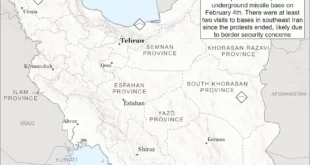 TEHRAN (FNA)- The five permanent members of the United Nations Security Council plus Germany failed to come to a mutual accord on Iran’s nuclear program.
TEHRAN (FNA)- The five permanent members of the United Nations Security Council plus Germany failed to come to a mutual accord on Iran’s nuclear program.
Political directors from the foreign ministries of the US, UK, Russia, China, France, and Germany attending a meeting on Thursday evening in Paris reaffirmed their dual-track approach of dialogue and sanctions toward Iran.
“We have always been supporters of both sanctions and dialogue, and it must continue like that,” French Foreign Minister Bernard Kouchner told journalists before the meeting.
The French Foreign Ministry in a statement announced that the participants of the Paris meeting agreed to continue their negotiations on Iran’s nuclear program in the coming weeks.
“It’s up to the American President-elect Barack Obama to open up a dialogue between Tehran and Washington after he is sworn into office in January and as promised by him during his election campaign,” Kouchner said.
French Foreign Ministry Spokesman, Eric Chevallier, said that a Turkish proposal for playing a mediating role in Iran’s nuclear program is a positive initiative because it will help in reaching a diplomatic solution.
Chevallier, however, claimed that Iran has not given a positive response to the UN Security Council’s demands.
France is trying to portray herself as an initiator of efforts to confront Iran’s peaceful nuclear program in the time remaining for its EU presidency and transition of power in the US after the victory of the President-elect Barack Obama on November 4.
The US and her allies accuse Iran, a signatory to the nuclear Non-Proliferation Treaty (NPT), of conducting a covert military nuclear program. Iran rejects the allegations, insisting that its enrichment program is solely directed at the civilian applications of the technology.
The six major powers have offered a package of incentives to Iran with the aim of convincing the country to suspend enrichment in exchange for political and economic benefits.
Iran has so far ruled out halting or limiting its nuclear work in exchange for trade and other incentives, saying that renouncing its rights under the NPT would encourage world powers to put further pressure on the country and would not lead to a change in the West’s hardline stance on Tehran.
Iran has also insisted that it would continue enriching uranium because it needs to provide fuel to a 300-megawatt light-water reactor it is building in the southwestern town of Darkhoveyn as well as its first nuclear power plant in the southern port city of Bushehr.
Tehran has repeatedly said that it considers its nuclear case closed as it has come clean of IAEA’s questions and suspicions about its past nuclear activities.
Analysts believe that the US is at loggerheads with Iran due mainly to the independent and home-grown nature of Tehran’s nuclear technology, which gives the Islamic Republic the potential to turn into a world power and a role model for other third-world countries. Washington has laid much pressure on Iran to make it give up the most sensitive and advanced part of the technology, which is uranium enrichment, a process used for producing nuclear fuel for power plants.
Washington’s push for additional UN penalties contradicts a recent report by 16 US intelligence bodies that endorsed the civilian nature of Iran’s programs. Following the US National Intelligence Estimate (NIE) and similar reports by the IAEA head – one in November and the other one in February – which praised Iran’s truthfulness about key aspects of its past nuclear activities and announced settlement of outstanding issues with Tehran, any effort to impose further sanctions or launch military action against Iran seems to be completely irrational.
The February report by the UN nuclear watchdog, the International Atomic Energy Agency, praised Iran’s cooperation in clearing up all of the past questions over its nuclear program, vindicating Iran’s nuclear program and leaving no justification for any new UN sanctions.
Many world nations have called the UN Security Council pressure against Iran unjustified, especially in the wake of recent IAEA reports saying Iran had increased cooperation with the agency.
 Eurasia Press & News
Eurasia Press & News



